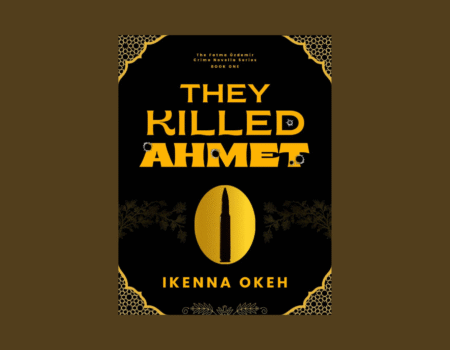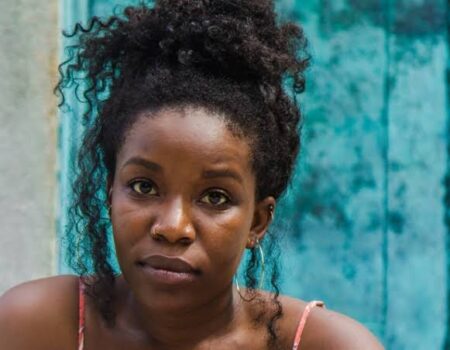A review of Ama Asantewa Diaka’s Someone Birthed Them Broken
I like to think of Accra, Ghana as a city of circles. A city so small that there is a chance somewhere someday, you will meet an old friend. A city so small that we may each have so many mutual new/old friends without our knowledge. In Ama Asantewa Diaka’s Someone Birthed Them Broken, there is an intentional use of plot across the fourteen stories, one so intentional that like a railway line, they are all connected. This non-flippant introduction of character or plot in each story, spinoffs or sequels if we’d like to call them that, gives off a sense of an author who understands the way of life of her people, and like a brush dipped into paint, makes a display worthy of its source. And it is perfect how our first story, “god or whatever,” sets the arena for this display.
It is a wide practice between the Akans of Ghana for a child to belong to the mother and her people. Because of this separation, a road can be made that will lead us to why there is almost always a distance between fathers and their sons. This distance that is shaped like anger. This anger unanswered for turns into a generational burden where sons repeat the sins of their fathers. When we meet Diaka’s Kusi Opoku Agyemang Snr., we are plunged into this failed dynamics. How Opoku the son believes that “if my father had borne the responsibility of raising me, he wouldn’t have had kids like a child squirting pee.” How Opoku Snr, the son, would rather be untethered from the burden of being the caregiver to his family and be willed into a life “dating three girls… and plotting 101 ways of not getting caught.” How Opoku Snr, the father, would be known by his own son, Nana Kweku Opoku Agyemang Jnr, years later in the story “patchwork,” as “a good-for-nothing bastard spreading his seed like an overly paid gardener.” See how the son is doomed to repeat the sins of the father, and how fitting that Diaka, a woman, writes of this, because oftentimes, men, we fail to see ourselves.
In A Lover’s Discourse, Roland Barthes suggests that, “the third-person pronoun is a wicked pronoun: it is a pronoun of the non-person, it absents, it annuls.” This is to say that, oftentimes when we narrate a story, we do everything to not use an “I” or a “You” so as to cleave flesh from bone. To absent matter. In the fourteen stories of Ama Asantewa Diaka’s short story collection, this third-person pronoun of absenteeism was used only twice. I think this allows the roots of intentionality in Diaka’s work to dig deeper.
In the story, “the year i turned twenty-three,” we walk into the life of Boatemaa. A woman unhinged by love. So unhinged by it that, she understands that her belief in the man she loves who thinks he will be more famous than James Barnor is worthy of some kind of prayer. In the story, “fear means boy,” Diaka uses the first-person narrator to tell us of friend-zoning. The “Baaba, who you tell at least once a day, to discourage any friend-zoning, that given the opportunity you would press your face into her ass.” The question is, who holds no familiarity to these? That Roger Reeves’ rose of desire nailed and bled. The “You” and “I” narrator silently saying: “this is our Ghana. I am part of this too. You are part of this too.”
In the glorified age of clans in Ghana, there was a wide appreciation of totems. The use of symbols to make representations of a clan. Someone might even add that, in Akan, symbolisation is a part of us. The Adinkra symbols expressing the connection between the verbal and the visual in Akan culture. It is no surprise that, Diaka adopts this practice in her collection. The making of (visual) art to be used as endnotes for each story in the collection. For example, The endnote totem in the story “footnote” is of a happy woman, a line splitting her in half; the other half, a reverse moment where this woman is anything but happy—she is wailing. Forget about the happy-sad point for a second. This story, “footnote,” is written using both a first-person and a second-person point of view. The first part of it, the second-person narrator recounts the events that led to our character’s shrinking. How the event of rape unanswered for can break a person. The second part of the story, the first-person narrator gives us a peek into the repercussions of rape—this shrinking where it feels as if the body swallowed the shape of an invisible footnote. Where the event is closed like a finished book, and although it still rattles, you do not speak of it until it is safe to talk to someone you hope can help you make sense of that life. See how this endnote totem works? An image of it is enough to express the most important facet of our story.
In Diaka’s Poetry collection, Woman, Eat Me Whole and her chapbook, “You Too Will Know Me” published in the Sita boxset of the APBF, the defining traits of these poems is language. The ability to provide an experience for a reader garnered from what Victoria Chang calls in Dear Memory, “…the loss of self to language.” This ability so linked to Diaka also pours into her Someone Birthed Them Broken.
“You think fear is a tummy ache that never gets better. It doesn’t diminish, just further diffuses.” (Stubborn Anyway)
“…So I let the silence sit. I intended for it to sit just a little longer, float around, find its way into her throat, and throttle the disappointment or pride or whatever it was that sat there.” (Silence)
“Yeah, Yoofi swears by capitalism and neoliberalism. He says Ghana’s long-term track record is nothing to build futures on… we are still in deep trenches… His exact words were ‘we are toothless dogs in a cruel game of catch” (This Bizarre Madness)
“The first therapist she went to tried to use the name of Jesus like it was a brightly colored plaster,… By the time a fitting therapist had been found Baaba had overdressed her vulnerability and taught her pain how to use its inside voice.” (Can I Get An Amen?!)
Reading her collection, in some parts, I was immediately reminded of the rhythm Ghanaian-Brit author, Caleb Azumah Nelson adopted in his Open Water. That when Uche Nduka once said, “light a poem and smoke it,” the language of the work magics itself through you like a psychedelic.
No new-age Ghanaian author does it like Ama Asantewa Diaka. Matthew Salesses in Craft In The Real World wrote that, “to be a writer is to wield and to be wielded by culture. There is no story separate from that. To better understand one’s culture and audience is to better understand how to write.” How Diaka in exploring love culture, motherhood, masculinity, and adulthood has written a story so grounded to its Ghanaianness is a testimony of her understanding of the Ghanaian culture. That to intentionally find room for the “wodi baako wo bedi mienu” song of egg sellers marauding the Ghanaian street is to say, “Ghana, this is for you. Take. Eat.”
I Echo
I Echo is the pen name of Ghanaian-Nigerian writer Chris Baah who writes predominantly from Accra, Ghana. His works mostly revolve around masculinity, love, and connections. Dreaming of exploring the world, new cultures and new conversations, he hopes he can save the world by saving himself. He's on X as @AyeEcho.




